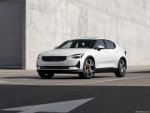I know the charger has seemingly done well in the shrinking sedan market and it also wears 4-doors well but you have to wonder if FCA is nervous about spending all that money on its next gen model when the market could be collapsing. They have to be skittish especially after the dart and 200. Coupe sales are also very strong, this angle could allow them to make the challenger a little smaller to go directly against the mustang and camaro while letting the charger be the bigger, more luxurious muscle car that it used to be in the late 60's while making it a true modern and futuristic 68-70 design.
The Charger is doing very well in fact. Dodge basically has a monopoly on the market (like Toyota and Honda have on the compact car market). It sold 80,226 units last year. There's really no good reason to make the Charger a coupe when it's doing just fine in sales.
Making the Challenger smaller; when it has bested the Camaro multiple times for No.2 in "pony car sales", doesn't make sense either. I suspect that the Camaro is losing sales for two reasons. The first is the styling. The second is because it's getting smaller. As far as I know, there are widespread complaints of it being hard to see out of and the cockpit being cramped (due to its size). The Challenger is beating the Camaro despite its "size disadvantage". Really, the Challenger doesn't need to get smaller. It just needs to go on a bit of a diet.
The Camaro might get even smaller still. If Chevrolet gets rid of their front-engined Corvette completely and just has the C8, what car will take that spot (front engine sports car) in their lineup? The Camaro. Even if it doesn't get smaller, Dodge only needs to introduce a "Son-of-Viper" (trademark
@Muther) and they'll have a vehicle to compete with the Camaro. And no, a Barracuda (IIRC) is not happening. A "Son-of-Viper" is much more likely than a Barracuda. Bottom Line: If the Camaro does move "upmarket" to replace the C7 'Vette, that'll just move the Camaro even further away from competing with the Challenger.
I can't imagine any automaker that isn't nervous about spending money on a next-generation vehicle. They're basically taking a risk by trying to improve on an existing vehicle (or trying to create an entirely new one). What happens if they fail? Well, that's tons of money down the drain. Now, whether or not they're more nervous due to the market collapsing is a different issue. Not only do they have to satisfy existing Charger owners but they also need to try and get new ones into the mix. That won't be easy. There's also this thought to contend with: The Charger is currently defying trends. Despite the market collapsing, the Charger is doing well in sales. I think the problem is less "the large-sedan market is collapsing" and more "can the next-generation Charger continue to defy the trend?" To put it another way, I think the problem isn't so much the market itself, but if the next Charger will be just as much of a hit as the current. It's a much more "individualized" problem, rather than a systemic one IMHO.
The difference with the Dart and 200 is the markets. Toyota, Honda, and I think Nissan already have big sales in the markets the Dart and 200 were trying to compete in. Trying to drag away sales from established brands in those markets was wishful thinking at best and possibly naive at worst. Dart and 200 launch problems didn't help, multiple Dart SEMA concepts with parts that were promised but most never delivered on didn't help, and things about the 200 I won't get into also didn't help. What I'm getting at is that the Dart and 200 aren't good examples of why FCA should be squeamish about the Challenger/Charger/300. Because unlike the Dart and 200, the Challenger/Charger/300 are selling well and essentially have a market all to themselves. The Dart and 200 were fighting in
very competitive markets and when they saw that they weren't making much money in those markets (for multiple reasons) they decided to stop production of those vehicles and switch focus on a market they could make money on. The trending CUV (and now SUV) market. That market wasn't heavily competitive IIRC and thus they could pump out some vehicles and make more money. But what competition does FCA have in the markets the Challenger/Charger/300 sell in? Little to none.



